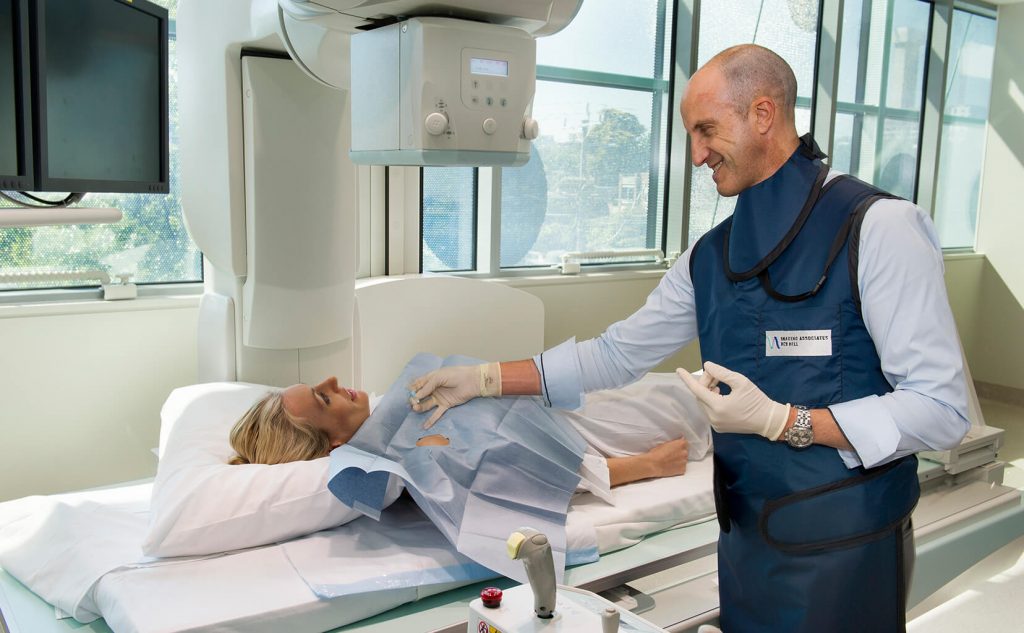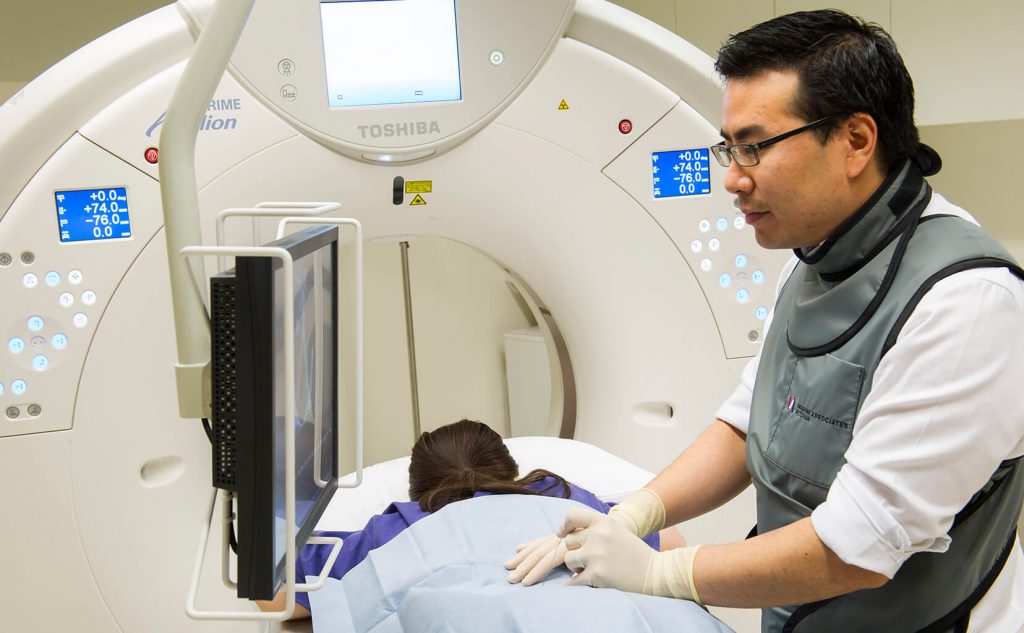Interventional Sports, Spinal and Pain Management
Musculoskeletal Injections
Acute and chronic pain can be an emotionally and physically taxing concern. It can affect so many facets of your life from sleep disturbance to mood change and even play upon relationships.
By the time you arrive at the point to trial an intervention procedure, you want to make sure you are with a safe and experienced team. The doctors at Imaging Associates are compassionate and caring and understand how important a good outcome is for you.
We are seen as leaders in the field of sports, spinal and pain management. Our doctors pride themselves on their gentle techniques. For some, their skills have been honed in the cauldron of AFL football games assisting club doctors and players during match play. These pressures demand accuracy, outcome and timeliness.
At Imaging Associates you will be cared for by an experienced team motivated to get you back to enjoying life.
Ultrasound Guided Injection
When performing an injection, ultrasound imaging allows the radiologist to see the needle under the skin, and confirm it is in the correct location to administer the medication. This may be to alleviate pain, reduce inflammation or treat conditions such as arthritis, tendinopathy or bursitis.
The radiologist uses the ultrasound camera to visualise the needle entering into the treatment area and slowly injects a small amount of the appropriate therapeutic agent (e.g. corticosteroid for anti-inflammatory purposes, or autologous blood (ABI) for healing). The technique may also be used to withdraw excess fluid from a joint, cyst or ganglion. The procedure will take 5-10 minutes and your allocated appointment time is likely to be 15-20 minutes.
Autologous Blood Injection (ABI)
ABI is a procedure where a small amount of your blood is taken from your arm and injected straight into the injured part of your body. This acts as a natural anti-inflammatory, helping to heal injuries in your body, and help in tendon, muscle and joint injuries, and in some cases, osteoarthritis. The success rate is generally 70-80 per cent in most people and it generally takes about 4-6 weeks to notice an improvement. Sometimes people will need more than just one treatment. This procedure usually takes 20-30 minutes.
Platelet Rich Plasma (PRP) Injection
PRP is one of the components that make up your blood and is a natural anti-inflammatory that helps heal injuries in your body. This procedure helps in tendon, muscle and joint injuries and in some cases with osteoarthritis. The success rate is generally 70-80% in most people and it generally takes about 4-6 weeks to notice an improvement. Sometimes people will need more than just one treatment of PRP. This procedure usually takes 20-30 minutes.

Shoulder Hydrodilatation
This is used for the treatment of ‘frozen shoulder’ (adhesive capsulitis), where a shoulder hydrodilatation is performed under real time x-ray (fluoroscopy) to assist in improving mobility and decreasing pain. This procedure can also be performed under ultrasound guidance. It involves a radiologist injecting fluid into your shoulder joint in an attempt to stretch the area around the joint, allowing for movement. Cortisone anti-inflammatory medication is often injected at the same time, if requested by your doctor.
Orthokine (Autologous Conditioned Serum)
Your doctor may refer you for Orthokine treatment if you have joint pain and inflammation and surgery is not an option. Imaging Associates has treated hundreds of patients who have had arthroscopic surgery and have ongoing joint pain and swelling, as well as patients who have been told they need a joint replacement but want to put it off for some time. Please call our clinic to discuss your suitability for this treatment. A pretreatment MRI scan can be very helpful in assessing the degree of joint degeneration. On the day or so before your treatment, approximately 30-40 ml of your blood will be collected and prepared. The preparation takes 6-8 hours. Your prepared plasma is then kept under sterile conditions in a plasma freezer at -30 Celsius degrees.
Direct Tendon Injections
Platelet Rich Plasma (PRP) Injection
PRP is one of the components that make up your blood and is a natural anti-inflammatory that helps heal injuries in your body. This procedure helps in tendon, muscle and joint injuries and in some cases with osteoarthritis. The success rate is generally 70-80% in most people and it generally takes about 4-6 weeks to notice an improvement. Sometimes people will need more than just one treatment of PRP.
Individual treatment varies between 1-3 injections over 3-12 months. During a single appointment, our nurse collects 8-9mls of blood from your arm, into a blood collection tube. This tube is then placed for 7 minutes in a centrifuge. Once spun, the PRP is extracted by the radiologist using a syringe. The PRP is injected by our radiologist under image guidance into the region of need.
Time required
This procedure usually takes 20-30 minutes.
Risks
Before proceeding, please ensure you have a clear understanding of the procedure and discuss any concerns with your doctor. You may experience soreness at the site of injection or pain in the area being injected for up to one week after your injection. There is a very small risk of infection.
Spinal
Radio Frequency Denervation
Radio Frequency Denervation (RFD) or ablation is a minimally invasive procedure where heat is pulsed through a fine needle to disable and prevent nerves from transmitting pain signals.
While RFD has been used traditionally to treat facet joint, sacroiliac joint and back pain, it has been used more recently to treat soft tissue conditions such as plantar fasciitis, groin pain and foot neuromas.
Radio Frequency Denervation – Foot
The procedure takes approximately 30 minutes plus recovery time, and you will be asked to sit up on the ultrasound bed with your knee up and foot flat on the bed. If you have already had a good response to diagnostic injections RFD offers you a realistic chance of good long term pain relief.
Radio Frequency Denervation – Back
The procedure takes approximately 30 minutes plus recovery time, and you will be asked to lie on your stomach and a diathermy pad will be placed on the opposite thigh to where the procedure is being performed. If you have already had a good response to diagnostic injections, RFD offers you a realistic chance of good long term pain relief.
Facet Joint Injection
A facet joint is a small joint of the spine that provides stability and helps guide motion. These joints are found throughout the whole spine, from the neck down to the lower back. They become painful due to arthritis, injury or mechanical stress. A cortisone injection reduces inflammation and provides long lasting pain relief from 3-6 months. Results vary from person to person.
There is no preparation required for this procedure, and the appointment usually takes 30 minutes.

Epidural Injection
An epidural injection is a mixture of a local anaesthetic and a steroid, such as cortisone, which is injected into the space surrounding the spinal cord (epidural space). Epidural injections are useful to settle down pain that is associated with inflammation within the lumbar spinal canal.
Pain relief can sometimes be obtained with this technique for acute lumbar disc herniations, occasionally with acute spinal pain and it may provide some relief for some sufferers of spinal stenosis. Epidurals can also be used to diminish neural tension and hence can be used for hamstring and calf dysfunction.
This procedure takes about 30 minutes and you will be transferred to the Day Recovery Unit following the procedure and stay with us for a short period of time.
Nerve Root Block
This is an injection next to a nerve of your neck or lower back as it leaves the spine. It is a way to treat neck, back and leg pain not helped by other treatments, and works in approximately 70% of patients. There is no preparation time required and you must have someone drive you home after this procedure.
The procedure takes approximately 15-20 minutes depending on the number of nerves injected.
Results
The report from our radiologist will be forwarded to your doctor as soon as possible. If there are any urgent findings, a radiologist will notify your referring doctor immediately.
What do I need to bring?
- Referral from your doctor
- Medicare card (if applicable)
- Healthcare card/Pension card/Student card (if applicable)
- Previous x-rays/scans (if applicable)
What we need to know
Pregnant/Breastfeeding
Please advise us if you are pregnant or think you might be pregnant, or if you are breastfeeding.
Medications
Please advise us of any medications you are taking. They may affect the timing of your appointment.
Allergies
Please advise us of any allergies.
